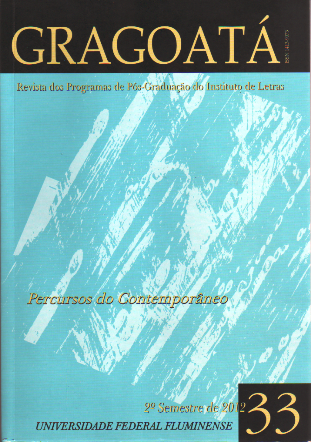Uma boa mãe de família chicana: a práxis cotidiana na série "Brown Angel Mysteries", de Lucha Corpi
DOI:
https://doi.org/10.22409/gragoata.v17i33.33019Palavras-chave:
policial chicana, práxis cotidiana, mitosResumo
As práticas cotidianas marcam presença na série policial Brown Angel Mysteries, da escritora chicana Lucha Corpi. Com base na teoria de Michel de Certeau sobre a práxis cotidiana, desenvolvida em A invenção do cotidiano, este artigo propõe-se a discutir de que modo os usos e fazeres do dia-a-dia, como o trabalho doméstico e os mitos e crenças herdados da tradição mexicana, representam um meio de opor resistência às práticas socioculturais dominantes, assim como seu papel político como uma tática por meio da qual as comunidades marginalizadas representadas buscam se (re)apropriar de um espaço cultural, político e socioeconômico, adquirindo novos significados no espaço de confronto entre o centro de poder e a periferia. Por meio da caracterização da protagonista da série, Gloria Damasco, Lucha Corpi abre o gênero policial à diversidade cultural, oferecendo uma percepção não-eurocêntrica da realidade, que aceita como real o conhecimento que vem de fontes intangíveis como os sonhos, as visões, a intuição e a percepção extra-sensorial. Essas experiências não-racionais se entrelaçam à presença de mitos fundamentais para a cultura e memória chicanas – como La Llorona e La Malinche – para apresentar um enredo policial que subverte a lógica cartesiana da ficção detetivesca tradicional.Downloads
Downloads
Publicado
Edição
Seção
Licença
AUTORIZAÇÃO
Autores que publicam em Gragoatá concordam com os seguintes termos:
Os autores mantêm os direitos e cedem à revista o direito à primeira publicação, simultaneamente submetido a uma licença Creative Commons Atribuição 4.0 Internacional (CC BY 4.0), que permite o compartilhamento por terceiros com a devida menção ao autor e à primeira publicação pela Gragoatá.
Os autores podem entrar em acordos contratuais adicionais e separados para a distribuição não exclusiva da versão publicada da obra (por exemplo, postá-la em um repositório institucional ou publicá-la em um livro), com o reconhecimento de sua publicação inicial na Gragoatá.
A Gragoatá utiliza uma Licença Creative Commons - Atribuição CC BY 4.0 Internacional.











